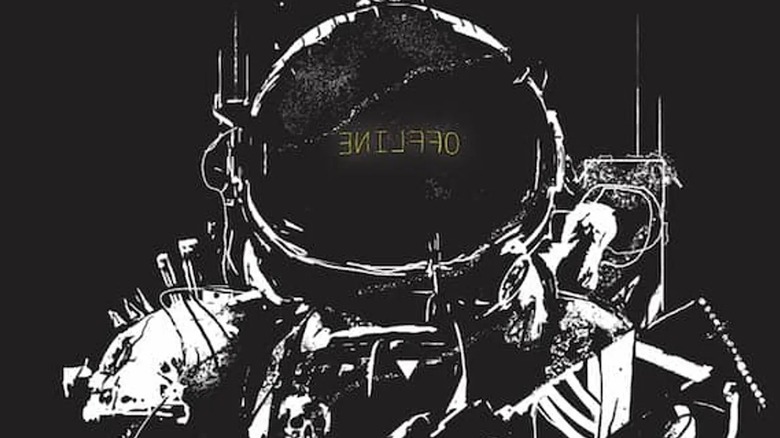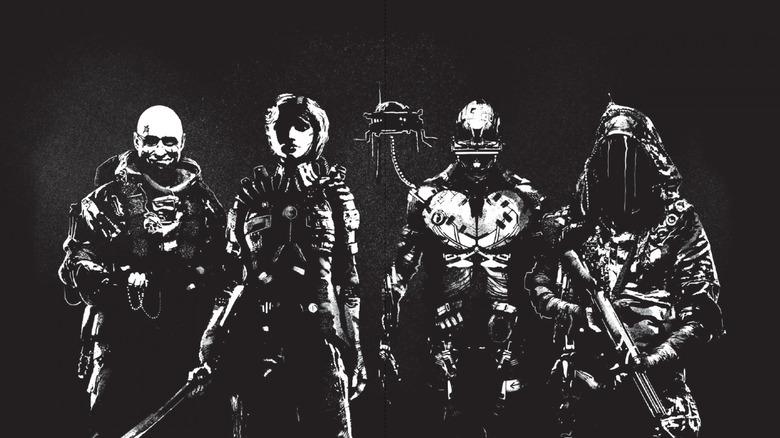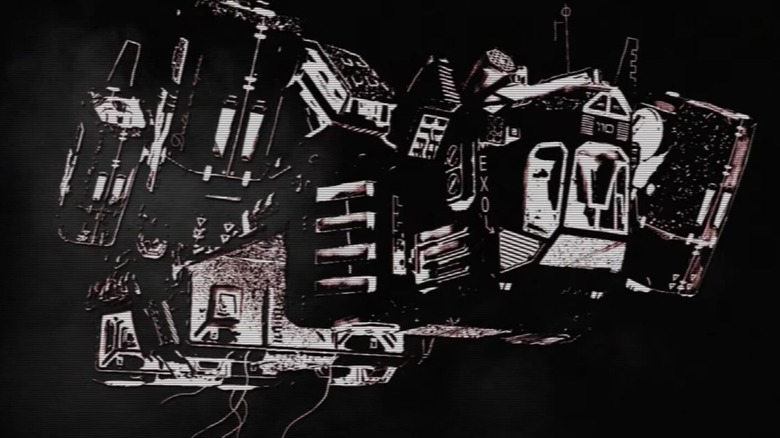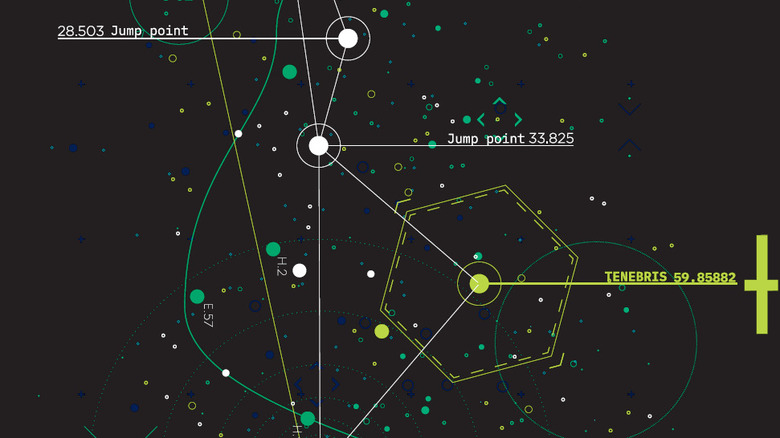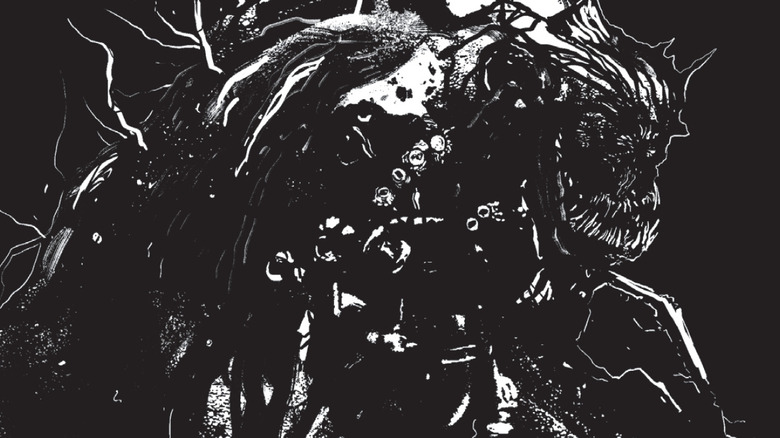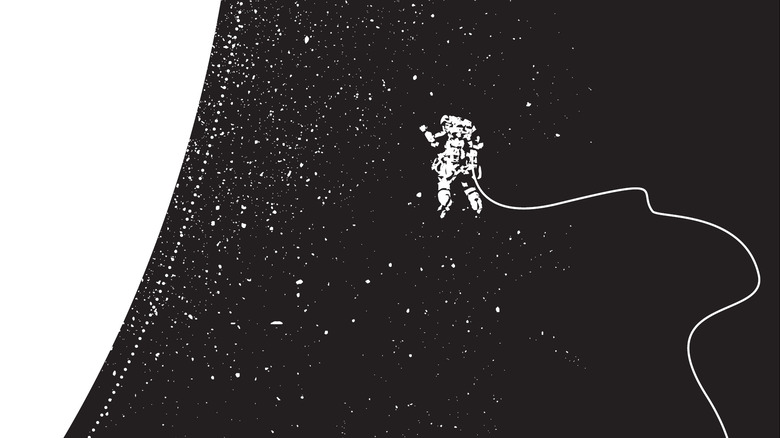Death In Space Is A Sci-Fi Horror RPG That Lets You Have A Good Time Simulating A Bad Time
(Welcome to Cardboard Cinema, an ongoing series where we look at board games inspired by or connected to our favorite media. In this edition, we look at an RPG that offers the ultimate horror/science fiction roleplaying experience.)
As a child of the '80s, I entered a cultural landscape where space horror was firing on every cylinder. From the "Alien" franchise to VHS staples like "Screamers," the '80s were an excellent time for horror movies of all budgets. Even now, as director-driven science fiction has become the norm, there's still the occasional "The Cloverfield Paradox" or "Life" to spark our appetite for monster movies with plenty of crawlspaces but a significant lack of oxygen.
And now, with tabletop roleplaying games like "Alien: The Roleplaying Game" and "Mothership" earning great reviews, there has never been a better time to launch your forays into the darkness of space. Of course, no game works as a better introduction to the genre than "Death in Space," the rules-light RPG from acclaimed Swedish publisher Free League Publishing. Combining traditional RPG elements with an, ah, "indifferent" approach to player survival, "Death in Space" is the perfect gateway drug for horror fans looking for an entry point into the world of tabletop roleplaying games.
Space capitalism gone wrong
If you like your science fiction tinged with class warfare and social commentary, "Death in Space" is the game for you. With nods to some of the classic blue-collar science fiction films of our time — the designers openly credit films like "Prospect" and "Outland" as inspirations in the rulebook — "Death in Space" presents players with an interstellar sandbox infused with capitalism and cosmic horror.
The game is set far into the future in the aftermath of a corporate war that led to the exhaustion of faster-than-light fuel. Forced to revert to sublight travel, humanity and its dwindling resources walk a treacherous line between death and survival. The Tenebris System, home to the climactic final battle between unnamed corporations, serves as the primary setting for the rulebook. Players start on board the Iron Ring, a vast collection of modules and debris fused to create a moon-sized space station.
Scarcity and the threat of violence hang over the heads of the party from the opening moments of the game. But there is also a darker threat — the Void, the darkness of space outside of known space. Some say that our universe is collapsing; others claim to have seen indescribable monsters moving through the Void. All that is known is that the Void, whatever its nature, wreaks havoc with technology and biology alike. Humanity is transforming. Into what, no one can say.
Characters versus the void
Players begin each "Death in Space" campaign by rolling characters from a series of creation charts. Unlike more complex games — here's looking at you, "Traveller," you magnificent bastard — character creation is designed to move quickly. Each player can create a character in minutes, and much of the rulebook is intended to be open to interpretation. With six starting origins (classes) and various backgrounds, traits, and drives to choose from, players are free to position their characters however they see fit.
For example, say you roll a Solpod, a researcher who chooses to hibernate for decades and measures the passage of their lifespan in centuries. The dice may determine that you are an intergalactic traveler who is inventive and driven by a personal relationship. Each descriptor has been randomly selected, but even inexperienced players can use these prompts to stitch together a backstory worth exploring. In many ways, narrative guardrails make it easier for players to stitch together their shared galaxy.
And like most roleplaying games, players navigate the universe using a series of characteristics. Body, Dexterity, Savvy, and Technology are your character's attributes, and you determine each proficiency by rolling two D4 and subtracting the second number from the first. Roll well, and you may get a +3 modified to one or more of your skills. Roll poorly, however, and it's just as likely you will have one — or even four — skills with a negative modifier.
Most mechanics ask you to beat the game's baseline skill check of 12. Want to persuade a stranger to give you directions? Roll a D20 and add your Savvy modifier. Want to punch an enemy in the face as hard as you can? Roll higher than their defense rating – a standard 12 difficulty plus or minus their Body modifier. When you fail, you collect Void points for rerolls, but be careful: like many versions of the Free League Year Zero system, these bonus attributes can have disastrous outcomes if your luck does not hold (spoiler alert: prepare to be corrupted by the Void).
Rules-light roleplaying
As the quickness of character creation denotes, "Death in Space" is a rules-light game. From a design perspective, the emphasis is more on its accessibility than on mastering its mechanics. That makes it particularly attractive to first-time DMs. Long before fulfillment on the game had even started, I chose "Death in Space" as the game I wanted to DM first; I knew that the light ruleset and familiar space-horror themes would give me a manageable margin for error as a first-timer.
And for the most part, I was right. While there are a handful of beginner modules to work from in your first few sessions, "Death in Space" is an open sandbox for players. There are rules for player combat, ship-to-ship combat, and mechanics for exploring the galaxy. There are also some rules around spare parts and the need to scavenge to survive. But the straightforward nature of the game means that you can focus on building an environment for your players without memorizing a dozen different tables and charts.
Of course, that simplicity can sometimes cut both ways. The inside cover of the "Death in Space" manual offers players a selection of gear and equipment, but like the character descriptions, a good chunk of the descriptions are left to you and the players to navigate. Likewise, starting kits – the randomized load-outs for each PC — rely heavily on narrative to function. In one session, players turned a packet of seeds into a deus ex machina of staggering importance; in other sessions, engineer toolkits were ignored altogether.
Death without dignity
But you can't call yourself "Death in Space" without the threat of permanent character death. Since players are forced to roll a single D8 to determine their maximum hit points, each player is potentially one round of combat away from being permanently killed. For some, this will be a turnoff; not everyone wants to invest themselves in a character who could be murdered on the very first combat roll. But for others — myself included — this is the game's biggest selling point. While other TTRPGs invite players to evolve to the roles of demigods, "Death in Space" is a constant struggle to survive.
And while death may be mechanically cheap, the game provides a powerful narrative tool to ease the loss of a favored character. Players roll a D20 and are granted a vision of how their character would have died if the Void had not intervened. In one session, my player's musician sacrificed his life to save an NPC. As his body slumped to the ground, his dying vision — the true death — saw him playing to a sold-out concert in his final moments.
Conclusion
As a newish convert to roleplaying games, the sheer depth of the industry can sometimes be intimidating. The major publishers of the most well-known games offer booklet upon booklet of modules and supporting manuals; meanwhile, independent TTRPG zines – where creative mechanics and gameplay designs often flourish – are countless and sometimes hard to differentiate without a strong knowledge of the medium.
That makes "Death in Space" something of a goldilocks title. Free League Publishing is a known and reliable entity in the TTRPG space, but "Death in Space" walks a fine line between over and underwhelming to perfection. And with a grotesque sandbox of space-stage capitalism and Lovecraftian nightmares to discover together, new players and DMs alike will find a home in the Tenebris System and beyond. It may not be the last game you ever play, but if it's your first, I doubt you'll walk away with less enthusiasm for the hobby.
